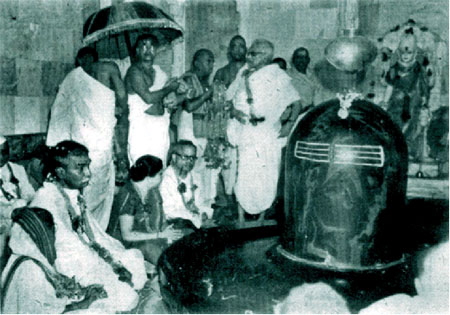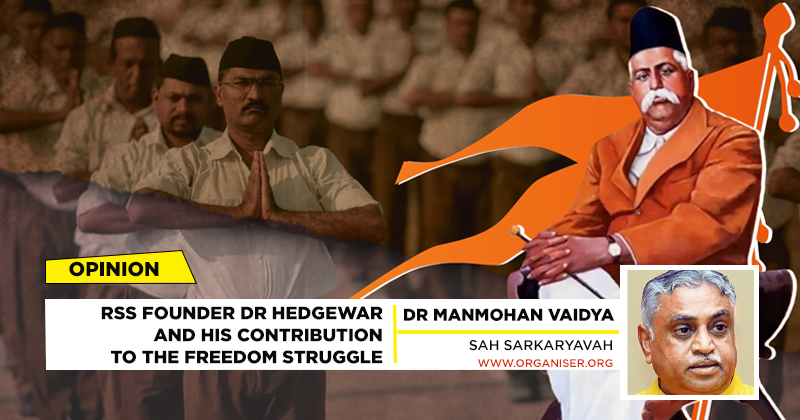Amrit Mahotsav offers us an opportunity to introspect and take stock of our journey so far–the areas we succeeded and the areas where we faltered. In our journey of 75 years since 1947, have we lived up to the ideals cherished by our forefathers? As we aspire to rebuild a society confident in itself, its heritage and culture, it is important for us to revisit the whole Idea of the Bharatiya freedom movement from the perspective of Swa, and how we can use those ideals to build our future and reclaim our civilisational grandeur.
After we got the Independence, there has been a concerted attempt to drift away from the path of swa which had shaped our freedom movement. Political and economic exploitation or, religious conversion and, most important of all, the partition of Bharat were all attempts by the colonial rulers – albeit organised attempts – to dilute the idea of Swa.
This 75th Independence Day celebration is a great opportunity for all of us to revisit, refine and reinvent our lost ‘collective truth’ about the whole narrative of freedom struggle, to explore and acknowledge the unsung heroes of the freedom struggle as well as to change our perspectives to analyse the unfolding truths about our past and collective identity.
British ruled Bharat for about two hundred years. Bharat got freedom from the British Raj on August 15, 1947. The exploitation of the Bharatiya people and the Bharatiya economy by the British made Bharatiyas realise the need for a united effort to drive the British out of Bharat.
It is a fact that the Bharatiya people never accepted foreign domination without resistance. Ever since the fifteenth century, there had been a number of popular protests in different parts of Bharat by peasants, workers, Vanvasis, and others against the colonial rule. Their protests were no doubt localised and isolated but they significantly contributed to strengthening the voices against foreign rule.
During this long struggle for Independence our people fought for the Idea of Swa (selfhood); they believed that there would be no point in getting rid of the British without getting rid of the centralised, exploitative, and violent system of governance and the economics of greed it pursued. Shri Aurobindo and Mahatma Gandhi led this socio-philosophical construction with the idea of Sarvodaya, Swarāj, and Swadeshi. The first concept in this trinity was Sarvodaya, the upliftment of all; this includes the care of the Earth–of animals, forests, rivers, and land. The second is Swaraj, that is self-government. Swaraj works to bring about a social transformation through a small-scale, decentralised, self-organised, and self-directed participatory structure of governance. It also implies self-transformation, self-discipline, and self-restraint. Thus, Swaraj is a moral, ethical, ecological, and spiritual concept and method of governance. The third in this trinity is Swadeshi, ‘local economy’, which was an attempt to recreate the local demand and supply chains for local products and consumers. Earlier, the idea of Swadeshi was confined to economics, but later it was used in socio-cultural aspects as well. If we closely observe in the trinity (Sarvodaya, Swarāj, and Swadeshi), there is a common root in all these three words and that is Swa, which is the ‘self’. If we expand the Idea of Swa from the above trinity (Sarvodaya, Swarāj, and Swadeshi) we find that the colonial structure was a device to suppress this Idea of Bharatiya Swa through various methods and techniques. An attempt was made to diminish the Bharatiya Identity and self-respect of the people by enforcement of the foreign rule and foreign religion in the land of Ram and Krishna.
It is important to look at this colonialism through the perspectives of religious-cultural imperialism to the people of the East by the people of the West. The notion of racial superiority and the white man’s burden is visible through various narratives, which must be re-investigated in the light of new findings in history.
It is a misfortune of India that after the Independence, the ideals that fired the imagination of our national heroes were dumped and leaders like Sardar Vallabhai Patel who believed in the power of Swa consciousness were side-lined
On the basic idea that inspired Freedom Movement, Lala Lajpat Rai writes, “The spiritual note of the present Nationalist Movement in India is entirely derived from……Vedantic thought.” For them, nationalism was not a political idea, as it was perceived in the West, but an inclusive, sacred, spiritual concept. According to Sri Aurobindo, the nation (Swarajya) is the ‘Mighty Shakti’ and nationalism is Sanatan Dharma. Therefore, fighting for freedom or working for society’s cause amounts to performance of a spiritual duty that is swadharma. It is not the conduct of some caste obligations as some chauvinists want us believe. In fact, one of the pioneers who awakened the Swa consciousness in the Indian mind was Tilak. His path-breaking call that ‘Swaraj is my birth right’ received momentous support not only from revolutionary freedom fighters, including Bipin Chandra Pal, Lala Lajpat Rai and Aurobindo Ghose, but the entire nation. Congress adopted attainment of Swaraj as its goal and swadeshi, swabhasha, swadharma and National Education were added as its other dimensions.
Many Western educated ‘liberal nationalists’ (and later, Marxist historians) used to dismiss cultural nationalism as communal. To those who recoil at the idea of cultural nationalism, Tilak said, “By alien, I do not mean alien in religion.” This is because of their lack of understanding of the concept of dharma, the bedrock of Indian Civilization. To such people “who claim to have imbibed the spirit of nationality and patriotism from the West”, Lala Lajpat Rai suggested: “Study a few chapters of the Vedic literature with care and thought, and I am confident that this study will open a panorama of new ideas to our view.”

Several organisations were launched keeping this in mind. For instance, Nabagopal Mitra, the editor of the National Paper, started Hindu Mela with the idea of rallying the people, particularly the educated youth, behind the concept of reviving the glories of the Hindu past and interpreting western education and culture in terms of the indigenous civilisation. The aim of the Hindu Mela was to make the people aware of the glories of Hindu civilisation, influence them to cultivate national language and ideas, and honour national symbols. A host of other initiatives were started in the course of time, including Mitra Mela by Savarkar, Arya Mahila Samaj, etc. Several authors, artists and theatre groups brought out works which drew inspiration and ideas from Indian folklore, epics and history. Bankim Chandra Chatterjee’s Ananda Math and the song Vande Mataram, Tagore’s Shivaji Utsav (1904), Madhusudan Dutt’s Sharmistha Padmavati and Krishna Kumari, Tilottoma, Meghanad Badha and several others gave a great push to the Hindu spirit consciousness of the self – Swa consciousness. As former editor of Organiser KR Malkani has rightly observed, in The RSS Story, all the great fathers of Indian renaissance invoked the innate Hindu spirit and roused the people to action by touching the same chord of the Hindu heart. Our great Freedom Fighters and national heroes had a clear vision as to how the national reconstruction should take place even after attaining Independence, so that India can play her ‘civilizational role‘. Dr Hedgewar started the RSS also with the aim of leading the country to ‘param vaibhavam’ (supreme glory).
It is a misfortune of India that after the Independence, the ideals that fired the imagination of our national heroes were dumped and leaders like Sardar Vallabhai Patel who believed in the power of Swa consciousness were side-lined. Conscious and concerted efforts were taken to denounce and destroy any sign of revival of that innate spirit, which saw a spark at the time reconstruction of the Somnath Temple in Gujarat.
Nabagopal Mitra, the editor of the National Paper, started Hindu Mela with the idea of rallying the people, particularly the educated youth, behind the concept of reviving the glories of the Hindu past and interpreting western education and culture in terms of the indigenous civilisation
While the secularists, Marxists and Urban Naxals have always been trying to undermine the spiritual unity of the country, Rashtriya Swayamsevak Sangh has been trying to reinforce our cultural and civilisational unity among its workers. This spiritual unity has helped us survive 7000 years of continuity. The six utsavas of the Sangh is to reemphasise this aspect. Apart from that the Sangh took up several projects which are aimed at emphasising the ideas of Swa. Ram Janmabhumi is one such campaign that has helped revive our links with our roots. The reconstruction of Ram Mandir at Ayodhya, reclaiming of Kashmir, Atmanirbhar campaign exemplify the revival of Swa consciousness. Once again we have to embrace Swadeshi, Swadharma and Swabhasha to lead our country to greatness.




















Comments